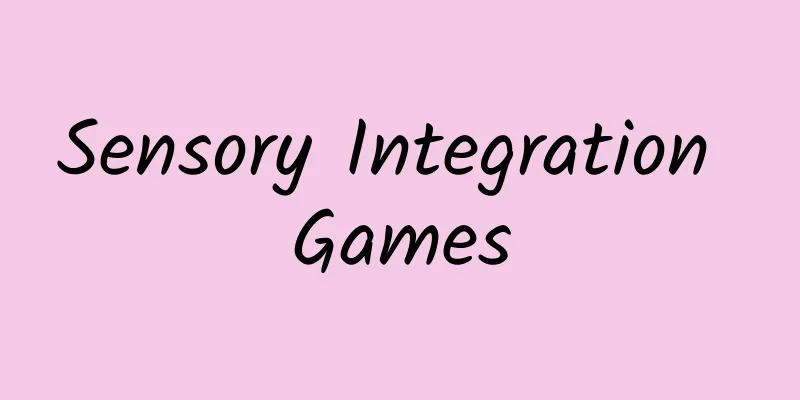Sensory Integration Games

|
Sensory integration is a good interaction between sensory learning and motor learning. The visual, auditory, tactile, olfactory, vestibular and balance information received by the body's sensory organs is processed by the brain and nervous system and directs the body to respond. Sensory integration dysfunction can lead to limitations in daily behavior and function. Sensory integration training can improve children's senses and motor functions, and is also helpful for interpersonal communication skills and language expression skills. It can also help children build self-confidence, improve concentration, and enhance their adaptability. So, how can we promote the development of children's sensory integration at home? Here are some practical sensory integration games for you. 1. Balance 1. Pass the buck Method: Prepare a ball, and have the children and parents stand face to face at a distance from each other and pass the ball to each other with their feet. Purpose: To improve balance and increase concentration. 2. Step on stones Method: Use a watercolor pen to draw circles of different sizes on colored paper and cut them out with scissors. Lay them on the floor as stones, and parents and children can step on them together. Purpose: To improve balance and exercise the fine skills of the upper limbs. 3. Stand on one leg Method: Let the child hold the chair and lift one leg. Older children or those with better balance can also lift their legs directly without assistance. Parents can give instructions and let the children lift and put down one leg. Purpose: To improve balance and the ability to follow instructions. 4. Go up and down stairs Method: Go up and down the stairs, holding the handrail, depending on the child's ability Purpose: To exercise balance and lower limb strength at the same time. 5. Jumping Method: Place circles or draw grids on the flat ground. You can jump with both feet or one foot. Choose different difficulty levels according to the child's ability. Purpose: To improve balance. 2. Tactile 1. Tickle Method: Parents can gently tickle tactile-sensitive parts such as the palms, soles of feet or armpits. If the child resists, gently massage him/her first, and then increase the intensity of stimulation appropriately after the child gets used to it. Purpose: To enhance tactile stimulation. 2. Scrub Method: When bathing, use a towel, massage ball, brush, sponge, etc. to wipe back and forth on the child's body. Purpose: To enhance tactile stimulation. 3. Alternate between hot and cold Method: Prepare a basin of cold water and a basin of warm water, and lead the children to play in the basins alternately to feel the different temperatures, taking care to avoid frostbite and scalds. Purpose: To enhance tactile stimulation. 4. Ocean ball pool Method: In the ocean ball pool, drop balls from above your head, hide children under the balls, etc. Purpose: To enhance tactile stimulation. 5. Sand games Method: Use sand and soil to knead and mold various shapes, objects, characters, etc. with your child. Purpose: To enhance tactile stimulation and graphic cognition. 3. Proprioception 1. Push the ball Method: The child lies prone on the ground, facing a wall 1.5 meters away, with his head raised and chest out, and pushes the ball back and forth toward the wall. Purpose: To enhance proprioception and concentration. 2. Trampoline Method: Let the children try to jump with their hands loose, spin and jump, and play the ball throwing and catching game. Purpose: To enhance proprioception, balance and concentration. 3. Drilling cage Method: Prepare a cage and let the children crawl through it or crawl forward. Purpose: To enhance proprioception and hand-foot coordination. 4. Skateboard Method: Slide down slowly from a gentle slope, or lie on the skateboard and spin on the spot, or crawl forward like a crab. Purpose: Enhance proprioception and strength training. 5. Swing Method: Let the children sit on the swing and hold on tightly, while the parents shake and protect them to prevent them from falling. Purpose: To enhance proprioception and sense of orientation. Sensory integration games are everywhere. Have you learned it? Let’s play together! |
<<: Why do you still have endometriosis after amenorrhea?
>>: Child growth and development assessment nutritional intervention
Recommend
Mammary ductography
I believe that many people do not know how to per...
Vaginal opening color
The vaginal opening is located at the entrance of...
What is the range of hcg value for ectopic pregnancy
All pregnant women need to pay attention to the o...
Pre-pregnancy trace element test
Pre-pregnancy trace element examination is a new ...
Blood sugar spikes after a meal? Do these 4 things right away to help you lower your blood sugar
Today, we are going to talk about a common scenar...
Why do you gain weight during your period?
Many female friends have found that their weight ...
Is Mapo Tofu the same as Spicy Tofu? What is the difference between Mapo Tofu and Spicy Tofu?
We all know that tofu is a common soy product in ...
Why are boys in sister-brother relationships so special? Can sister-brother relationships be successful?
Nowadays, sister-brother relationships are very p...
Can pregnant women eat thin shells?
Thin shellfish tastes delicious and has high nutr...
How to treat chronic salpingitis
I believe everyone knows the importance of fallop...
What to do if ringworm appears on face during pregnancy
For pregnant women, the thing they fear most is t...
Is it good to have tea stems? How to distinguish the taste of tea?
With the improvement of the quality of life, more...
Do I need to express the milk after weaning?
There will still be residual milk in the mother&#...
Why does urine smell bad during pregnancy?
Pregnant women are very weak during pregnancy, an...









